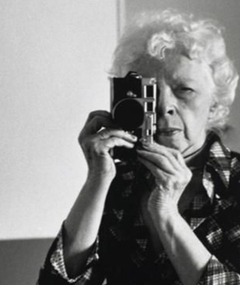The Jan Kesner Gallery is a fine art photography gallery in Los Angeles, California. It was the first woman-owned photography gallery in Los Angeles when it was established in 1987. The gallery is known primarily for its focus on contemporary and master works with conceptual or minimal themes, and for its support of regional and international photography.

Günther Förg was a German painter, graphic designer, sculptor and photographer. His abstract style was influenced by American abstract painting.
Laura McPhee is an American photographer known for making detailed large-format photographs of the cultural landscape—images which raise questions about human impacts on the environment and the nature of our complex and contested relationship to the earth.

Lisette Model was an Austrian-born American photographer primarily known for the frank humanism of her street photography.

Zoe Strauss is an American photographer and a nominee member of Magnum Photos. She uses Philadelphia as a primary setting and subject for her work. Curator Peter Barberie identifies her as a street photographer, like Walker Evans or Robert Frank, and has said "the woman and man on the street, yearning to be heard, are the basis of her art."
Linda Connor is an American photographer living in San Francisco, California. She is known for her landscape photography.
David Hilliard is an American photographer. A fine arts photographer who works mainly with panoramic photographs, he draws inspiration from his personal life and those around him for his subject matter. Many of the scenes are staged, evoking a performative quality, a middle ground between fact and fiction.

Grant Mudford, is an Australian photographer.
Rosalind Fox Solomon is an American photographer based in New York City.
Frank Paulin was born in Pittsburgh was an American artist and photographer. Paulin grew up in New York City and Chicago. At the age of 16 in 1942, his photographic education began as an art apprentice at Whittaker-Christiansen Studio, Chicago. In 1944, Paulin joined the Army, spending two years in the Signal Corps in Europe. During this time, Paulin developed his documentary artistic style by photographing wartime devastation of German cities. In 1946, Paulin returned to Chicago and enrolled at the Institute of Design, By the end of the 1950s, Frank Paulin's educational resume included studies at the New School under the renowned art director Alexey Brodovitch. In 1957, Paulin celebrated his first solo artist exhibition at the Limelight Gallery. Frank Paulin died in 2016.
Nathan Lyons was an American photographer, curator, and educator. He exhibited his photographs from 1956 onwards, produced books of his own and edited those of others.
Juergen Nogai is a German architecture, art and documentary photographer.
Roger Camp is a photographer, poet and educator. Initially self-taught, he began photographing in earnest on a transcontinental bicycle trip he planned and executed at age 15 (1961). Accompanied by his twin brother, Roderic Ai Camp, the political scientist, they rode from Orange, California to Dayton, Ohio and the following year to Victoria, B.C., Canada. The trips are chronicled in a two-part article in The American Geographical Society's Focus.

Light and Space denotes a loosely affiliated art movement related to op art, minimalism and geometric abstraction originating in Southern California in the 1960s and influenced by John McLaughlin. It is characterized by a focus on perceptual phenomena, such as light, volume and scale, and the use of materials such as glass, neon, fluorescent lights, resin and cast acrylic, often forming installations conditioned by the work's surroundings. Whether by directing the flow of natural light, embedding artificial light within objects or architecture, or by playing with light through the use of transparent, translucent or reflective materials, Light and Space artists make the spectator's experience of light and other sensory phenomena under specific conditions the focus of their work. From the movement's inception, artists were incorporating into their work the latest technologies of the Southern California-based engineering and aerospace industries to develop sensuous, light-filled objects. Turrell, who has spread the movement worldwide, summed up its philosophy in saying, "We eat light, drink it in through our skins."
Barbara Crane was an American artist photographer born in Chicago, Illinois. Crane worked with a variety of materials including Polaroid, gelatin silver, and platinum prints among others. She was known for her experimental and innovative work that challenges the straight photograph by incorporating sequencing, layered negatives, and repeated frames. Naomi Rosenblum notes that Crane "pioneered the use of repetition to convey the mechanical character of much of contemporary life, even in its recreational aspects."
Luisa Lambri is an Italian artist working with photography and film, based in Milan. Her photographs are often based on architecture and abstraction.
Charlotte Cotton is a curator of and writer about photography.
Miranda Lichtenstein is an American artist focusing on photography and video.
Anthony Hernandez is an American photographer who divides his time between Los Angeles, his birthplace, and Idaho. His photography has ranged from street photography to images of the built environment and other remains of civilization, particularly those discarded or abandoned elements that serve as evidence of human presence. He has spent most of his career photographing in Los Angeles and environs. "It is L.A.'s combination of beauty and brutality that has always intrigued Hernandez." La Biennale di Venezia said of Hernandez, "For the past three decades a prevalent question has troubled the photographer: how to picture the contemporary ruins of the city and the harsh impact of urban life on its less advantaged citizens?" His wife is the novelist Judith Freeman.
Mary Lum is an American visual artist whose paintings, collages and works on paper reference the urban environment, architectural forms and systems. Critic John Yau writes, "Mary Lum’s paintings on paper are based on collages, which are made from things she uses or encounters in her everyday life as well as photographs she takes of the places she visits. "





